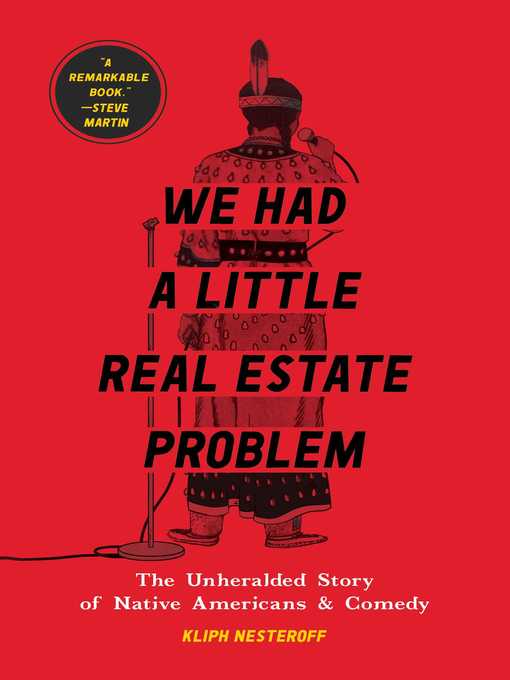
We Had a Little Real Estate Problem
The Unheralded Story of Native Americans & Comedy
- اطلاعات
- نقد و بررسی
- دیدگاه کاربران
نقد و بررسی

December 1, 2020
With a title inspired by one of Oneida Nation actor and comedian Charlie Hill's famous lines ("My people are from Wisconsin. We used to be from New York. We had a little real estate problem"), this latest work by comedy historian Nesteroff (The Comedians) focuses on an often-overlooked history. From Natives forced to become sideshow attractions in Wild West routines to white actors making a living playing Native characters in vaudeville and silent films, Nesteroff recalls an ongoing legacy of assimilation practices, stereotypes, and discrimination. The strongest parts of the book center on biographical sketches of Cherokee actor Will Rogers and how his grandfather signing the Treaty of New Echota, which led to the Trail of Tears, continued to haunt the family. Other insightful chapters recount the influence of Hill and his groundbreaking debut on The Richard Pryor Show in 1977. Hill, who became a regular at the Comedy Store and ended up writing for Roseanne, inspired several Native comedians, whom Nesteroff interviews throughout. While only a handful of women are featured, insight from Cayuse/Nez Perce actress Elaine Miles and Kiowa/Apache comedian Adrianne Chalepah is welcome. VERDICT With no real comparison book, this well-documented history, though uneven at times, should spark interest and future research.--Stephanie Sendaula, Library Journal
Copyright 2020 Library Journal, LLC Used with permission.

December 1, 2020
Humor is a form of resistance--one reason why Native American performers have contributed strongly to the comic tradition. The modern Native comic movement owes to several influences, including Bob Newhart, Richard Pryor, and the Canadian TV special Welcome to Turtle Island, which inspired numerous performers north of the border. Don't forget Rodney Dangerfield, one inspiration for an Ojibwe social worker and part-time comedian to drive the many miles to Minneapolis to deliver lines such as, "I think it's great that Bruce Jenner transitioned to Caitlyn Jenner...but I don't think she should have picked a young woman's name. I mean--she's seventy years old....Her name should be Gladys." Says another stand-up who's been at it long enough to see another generation or two rise behind him, "We're like the Columbus of Native comedians." Nesteroff, well known for his 2015 history The Comedians, takes a long view of the Native comic tradition, looking at the hundreds of performers who toured with Buffalo Bill's Wild West Show as a means of escaping an oppressive reservation system, a motivation that's still operative. The author also examines historical humorists. Some are well known--e.g., Will Rogers, who, though often identified as White, was born and died on Native land and who quipped, "I'm not one of those Americans whose ancestors came over on the Mayflower, but we met them at the boat when they landed." Others will be new to most readers, including Muscogee Creek writer Alexander Posey, broadly popular in the early 1900s but almost unknown today. Their descendants continue to work the comedy scene today, and most deserve wider attention, such as Marc Yaffee, founder of the Pow Wow Comedy Jam; and Vaughn Eaglebear, author of lines such as, "I donated some blood a couple weeks ago. One of the nurses asked me if I was a full-blooded Indian. I said, 'Not anymore.' " A welcome introduction to an aspect of Native American life that merits broader exposure.
COPYRIGHT(2020) Kirkus Reviews, ALL RIGHTS RESERVED.

January 1, 2021
With a title taken from a Charlie Hill joke (""My people are from Wisconsin. We used to be from New York . . . .""), Nesteroff (The Comedians, 2015) probes the history of Native Americans in stand-up comedy, from Buffalo Bill's Wild West shows, where Native performers were often ""recruited"" to avoid jail time, to the continued fight against racist portrayals by white actors. What the stoic stereotypes missed is how integral humor is to Native culture. Hill is perhaps the most famous name--and, to hear younger comedians tell it, the most influential--to come out of the stand-up boom of the 1970s and '80s, and he paved the way for the sketch-comedy group the 1491s and sitcom showrunner Sierra Ornelas, while Terry Ree keeps to the old-school musical-comedy routine that made him famous with partner Bruce Williams. In between longer chapters, current up-and-comers talk about their careers, including Johnny Roberts, who drives five hours each way for a few minutes of open-mic time in Minneapolis, and the intersection of comedy and politics at Standing Rock. Pop-culture and comedy aficionados will appreciate Nesteroff's compelling, wide-ranging work.
COPYRIGHT(2021) Booklist, ALL RIGHTS RESERVED.

Starred review from April 19, 2021
Comedian Nesteroff (The Comedians) delivers a veritable who’s who of Native American comedy from “the rez” to New York City in this sometimes disturbing yet beautiful history. Starting with the contemporary Ojibwe comic Jonny Roberts—who, like many of his contemporaries, must drive hours to get to an open mic—and jumping back to the racist history of nearly forced Native participation in P.T. Barnum’s and Buffalo Bill shows, Nesteroff’s narrative returns often to the story of Oneida comic Charlie Hill. Hill’s ability to weave Native politics artfully into his work made him a superstar in the ’70 after he starred on Letterman, and he later used his success to jump-start the careers of other Native comics. Nesteroff also covers the 1491s—a Native sketch group—and the latest crew of Native comedic stars, among them Adrianne Chalepa, and TV writers Lucas Brown Eyes and Sierra Ornelas, who continue to work to put Indigenous actors on the big screen. This sharp collection addresses the politics, history, and merits of Native comedy in a way that’s never been done before. Agent: Daniel Greenberg.




دیدگاه کاربران